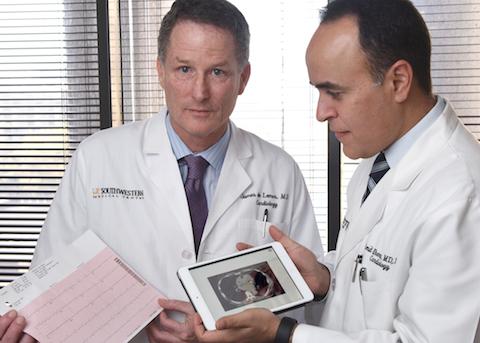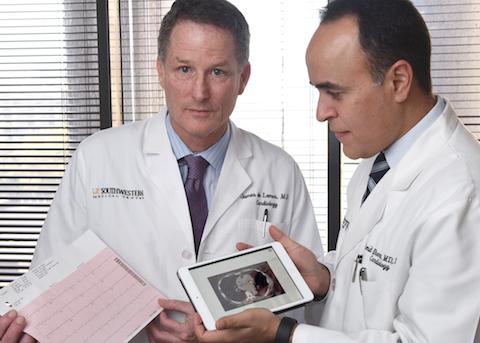
Credit: UT Southwestern
DALLAS – March 30, 2017 – Five simple medical tests together provide a broader and more accurate assessment of heart-disease risk than currently used methods, cardiologists at UT Southwestern Medical Center found.
Combined, results from the five tests – an EKG, a limited CT scan, and three blood tests – better predict who will develop heart disease compared with standard strategies that focus on blood pressure, cholesterol, diabetes, and smoking history, researchers reported.
"This set of tests is really powerful in identifying unexpected risk among individuals with few traditional risk factors. These are people who would not be aware that they are at risk for heart disease and might not be targeted for preventive therapies," said Dr. James de Lemos, Professor of Internal Medicine.
The five tests, and the information they provide:
- A 12-lead EKG provides information about hypertrophy, or thickening of the heart muscle.
- A coronary calcium scan, a low-radiation imaging test, identifies calcified plaque buildup in the arteries of the heart.
- A blood test for C-reactive protein indicates inflammation.
- A blood test for the hormone NT-proBNP indicates stress on the heart.
- A blood test for high-sensitivity troponin T indicates damage to heart muscle. Troponin testing is regularly used by hospitals to diagnose heart attacks, but high-sensitivity troponin fine-tunes that measure, pointing to small amounts of damage that can be detected in individuals without any symptoms or warning signs.
Four of the five tests are currently readily available and the fifth – high-sensitivity troponin T – will be available soon.
Researchers used data from two large population studies, including the Dallas Heart Study, that each followed a large group of healthy individuals for more than a decade. Their study, which appears in the journal Circulation, was partly funded by NASA to develop strategies for predicting heart disease in astronauts.
The new study focused on a broader spectrum of cardiovascular disease events rather than only those related to cholesterol plaque buildup, as traditional risk assessment does.
"A major focus of this study is to expand the scope of risk prediction beyond just heart attack and stroke. We believe that people are interested in the whole portfolio of heart problems that can develop including heart failure and atrial fibrillation," said Dr. Amit Khera, Professor of Internal Medicine and Director of UT Southwestern's Preventive Cardiology Program.
5 tests to better predict heart disease risk:
- A 12-lead EKG provides information about hypertrophy, or thickening of the heart muscle.
- A coronary calcium scan, a low-radiation imaging test, identifies calcified plaque buildup in the arteries of the heart.
- A blood test for C-reactive protein indicates inflammation.
- A blood test for the hormone NT-proBNP indicates stress on the heart.
- A blood test for high-sensitivity troponin T indicates damage to heart muscle.
The set of five tests not only expanded risk prediction to include the likelihood of heart failure and atrial fibrillation, but also proved to be a better predictor of heart attack and stroke than currently recommended approaches. Heart failure is a chronic condition in which the heart progressively weakens and atrial fibrillation is a heart rhythm problem. Both conditions have been increasing as the population ages.
"There has been a real need to bring modern science to the problem of heart disease risk prediction, which has relied on traditional risk factors for decades" said Dr. de Lemos, who holds the Sweetheart Ball?Kern Wildenthal, M.D., Ph.D. Distinguished Chair in Cardiology. "We wanted to determine whether advances in imaging and blood-based biomarkers could help us to better identify who was at risk for heart disease."
The added value of the test panel results from the careful selection of tests that were complementary but not redundant, Dr. Khera said.
"These five tests have all stood on their own already. And they each tell us something different about potential heart problems – they're additive. As a result, we are getting a good look at global cardiovascular disease risk," said Dr. Khera, who holds the Dallas Heart Ball Chair in Hypertension and Heart Disease.
The tests were combined in a simple scoring system with one point for each abnormal result. Compared with those with no abnormal tests, those with five abnormal results had more than a 20-fold increased risk of developing heart complications over the next 10 years.
The study was funded in part by a research grant from the National Space Biomedical Research Institute, a NASA-related consortium studying the health effects of long-term space flight.
"NASA is considering long-term missions, for example to Mars. Astronauts are highly trained people and there's a heightened investment in long-term missions. If someone has a cardiovascular event, that would be catastrophic," said Dr. Khera.
And what's useful for predicting astronauts' heart health is useful for the public.
"We're interested in taking the principles used by NASA and applying them to healthy people. An individual who is interested in obtaining a lot of information about his heart risk over the next 10 to 20 years can get a lot of useful information from these five tests," Dr. de Lemos said.
Both researchers emphasized, however, that these tests aren't for everyone and should only be done in collaboration with a physician with expertise in heart disease prevention, to help interpret the results.
Researchers used data from the Multi-Ethnic Study of Atherosclerosis (MESA), which included a population of 6,621 individuals, and the Dallas Heart Study, which included 2,202 individuals. Both studies include large numbers of minorities and women among their participants, and both studies involve individuals who were healthy at the onset of the study.
The landmark Dallas Heart Study, a multiethnic, population-based study begun in 2000, has led to more than 200 published scientific studies, and most notably identified a mutation in a gene called PCSK9 that resulted in extremely low levels of cholesterol. The Dallas Heart Study was established with funding provided by the Donald W. Reynolds Foundation.
###
Support for the study included the National Center for Advancing Translational Sciences of the National Institutes of Health, and Roche Diagnostics.
Other UT Southwestern researchers who participated in the study are Colby Ayers, Faculty Associate; Dr. Benjamin Levine, Professor of Internal Medicine and Director of the Institute for Exercise and Environmental Medicine, jointly run by UT Southwestern and Texas Health Resources; Dr. Jarett Berry, Associate Professor of Internal Medicine and of Clinical Sciences; Dr. Darren McGuire, Professor of Internal Medicine; and Dr. Mark Drazner, Professor of Internal Medicine.
Dr. Levine holds the Distinguished Professorship in Exercise Sciences; Dr. Berry is a Dedman Family Scholar in Clinical Care; Dr. McGuire holds the Dallas Heart Ball Chair for Research on Heart Disease in Women; and Dr. Drazner holds the James M. Wooten Chair in Cardiology.
About UT Southwestern Medical Center
UT Southwestern, one of the premier academic medical centers in the nation, integrates pioneering biomedical research with exceptional clinical care and education. The institution's faculty includes many distinguished members, including six who have been awarded Nobel Prizes since 1985. The faculty of almost 2,800 is responsible for groundbreaking medical advances and is committed to translating science-driven research quickly to new clinical treatments. UT Southwestern physicians provide medical care in about 80 specialties to more than 100,000 hospitalized patients and oversee approximately 2.2 million outpatient visits a year.
This news release is available on our website at http://www.utsouthwestern.edu/news.
To automatically receive news releases from UT Southwestern via email, subscribe at http://www.utsouthwestern.edu/receivenews.
Media Contact
Cathy Frisinger
[email protected]
214-648-3404
@UTSWNews
http://www.swmed.edu





